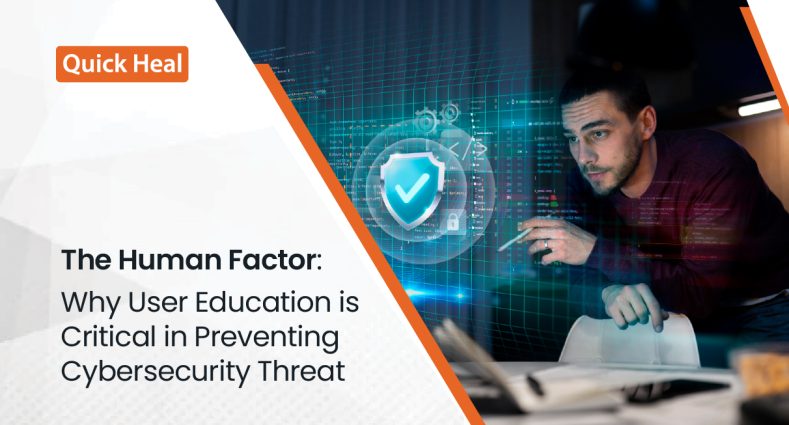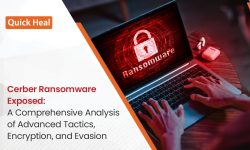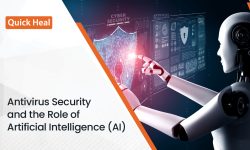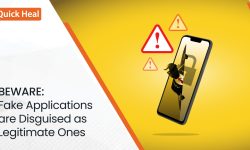The Human Factor: Why User Education is Critical in Preventing Cybersecurity Threats

The digital landscape is a vast minefield of evolving threats, and dangers lurk behind every unsuspecting click. Our interconnected society is rife with cybercrimes that continue to baffle us with their unprecedented levels of sophistication and pervasiveness. While technology and security measures strive to keep us safe, there is one crucial element that often goes unnoticed— the human factor.
It’s time to face the fact when it is undoubtedly staring right back at us! It is our own vulnerabilities that cybercriminals exploit, utilising tactics like social engineering and phishing attacks to penetrate our defences. It is high time we recognise the vital importance of user education in the battle against these relentless threats. In this blog we will explore the reasons why being aware and staying informed is paramount to our digital security and wellbeing. And, we will also delve into available tools that we can use, or practices we can adopt to minimise our digital risks. Prepare yourselves, the world of cybersecurity is calling, and here, knowledge is your first line of defence.
The Importance of User Education: Discover the Vital Key to Safeguarding Your Digital World
User education refers to the process of providing individuals with the knowledge and skills necessary to identify and mitigate cybersecurity risks. It empowers users to make informed decisions and take proactive measures to protect themselves and their digital assets. By understanding the importance of user education, individuals can actively contribute to their own cybersecurity. Whether it’s using antivirus software for PC or laptop or embracing secure browsing habits, user education forms the foundation of a robust defense against cyber threats.
Understanding Threats to Combat Cybersecurity
Recognize Phishing Attacks: Safeguard Against Deceptive Tactics:
Phishing attacks are a common form of cybercrime that target unsuspecting individuals through deceptive emails, messages, or websites. By understanding the characteristics of phishing emails, such as suspicious URLs or requests for personal information, users can avoid falling victim to these schemes. Implementing and regularly updating reliable antivirus software for PC or laptop can also provide an additional layer of protection against phishing attempts.
Secure Password Practices: Strengthen your Digital Fortress:
Weak or easy-to-guess passwords are a significant vulnerability exploited by cybercriminals. User education emphasizes the importance of strong, unique passwords and password management techniques. By creating complex passwords and refraining from sharing them, individuals can significantly reduce the risk of unauthorized access to their accounts. Additionally, utilizing password management tools and regularly updating passwords further strengthens the security of personal and professional accounts. It is essential to combine password best practices with robust antivirus software for PC or laptop to create a comprehensive defense against cyber threats.
Be Aware of Social Engineering: Enhance your Resilience:
Social engineering involves manipulating individuals into divulging confidential information or performing actions that compromise security. User education raises awareness about social engineering tactics, such as impersonation, pretexting, or baiting. By recognizing these techniques, individuals can develop a healthy skepticism and practice caution when interacting with unknown or suspicious sources. Implementing antivirus software for PC or laptop with built-in anti-phishing features can also provide an additional layer of protection against social engineering attacks.
Elevate Your Digital Security: Protection Beyond Antivirus
Once we have a broad understanding of the threats and are aware of the importance of recognizing them at the user-level, let us also explore a few practices that can contribute towards a more secure digital experience.
VPN (Virtual Private Network): Your Personal Shield
Secures and encrypts the connection between the device and the internet. It masks your IP address and encrypts your data, making it virtually impossible for hackers to intercept your online activities. Using a VPN, you can browse the internet anonymously, access public Wi-Fi securely, and protect your sensitive information from being compromised.
2FA (Two-Factor Authorization): The Lock & Key
Adds an extra layer of security to your online accounts, as it requires two pieces of evidence to verify user identity, which is typically a password and a unique, time-sensitive code. Even if a hacker manages to obtain your password, they won’t be able to access your account without the second authentication factor. This practice significantly reduces the risk of unauthorized access and protects your accounts from being compromised.
Password Manager: The Ultimate Safety Vault
Weak or easily guessable passwords makes accounts vulnerable to hacking attempts. A password manager is a secure tool that generates and stores complex, unique passwords for each of your accounts. No more struggling to remember multiple passwords. With this tool, you can ensure that your accounts are protected by strong, random passwords, minimizing the risk of unauthorized access and potential data breaches.
Regular System Backup: Plan B
This ensures that you have copies of your important files and data stored in a safe location. Should your system be compromised, you can easily restore your files without succumbing to the demands of cybercriminals. System backups provide an additional layer of protection and peace of mind, allowing you to quickly recover from potential data loss.
Practice Regular System Updates: Empower Your Digital Defence
Adopt the practice of regular system updates to stay one step ahead of hackers, patch up security vulnerabilities, and safeguard sensitive data. Proactively updating your software ensures you benefit from the latest patches and fixes, reducing the risk of unauthorised access.
Conclusion:
While antivirus software is an essential component of digital security, it should not be the sole reliance for protecting yourself from cyber threats. In the digital age, where cyber threats continue to evolve, there is no doubt that user education is paramount in preventing cybersecurity incidents. By equipping individuals with the knowledge and skills to recognize and mitigate risks, user education empowers them to become active participants in their own cybersecurity. Whether it’s understanding the signs of phishing attacks, adopting secure password practices, or staying vigilant against social engineering tactics, user education forms the backbone of a robust defense against cyber threats.
Remember, combining user education with reliable antivirus software for PC or laptop enhances overall cybersecurity resilience and ensures a safer digital experience for individuals and organizations. With Quick Heal, you not only get access to a range of comprehensive Antivirus Software products to shield your computers, laptops and devices from digital threats but also proactive updates, reports and much more.
Stay informed, updated and empowered in the face of evolving challenges with Quick Heal’s digital protection solutions.



No Comments, Be The First!